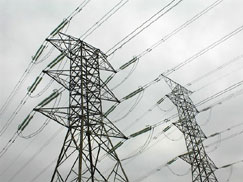South Africa has a plan for electricity
12 December 2014
A war room has been set up to oversee the implementation of a five-point plan to
address South Africa's electricity challenges following Cabinet concerns about the
disruptive effects of the recent power outages on the daily lives of citizens and their
impact on households and businesses.
"The lack of sufficient capacity to meet the country's energy needs remains a
challenge and all attempts are being made to ensure that we overcome the tight
energy situation," the Cabinet said yesterday in its statement following its regular
fortnightly briefing on Wednesday. It was the last briefing of the year.
"The Cabinet adopted a five-point plan to address the electricity challenges facing
the country," Minister in the Presidency: Planning, Monitoring and Evaluation Jeff
Radebe said in Pretoria after the briefing. "The lack of sufficient capacity to meet the
country's energy needs remains a challenge and all attempts are being
made to
ensure that we overcome the tight energy situation."
Minister of Energy Tina Joemat-Pettersson said the war room would be made up of
the departments of Energy, Co-operative Governance and Traditional Affairs, Public
Enterprises, National Treasury, Economic Development, Water and Sanitation and
Eskom, as well as technical officials.
"We bring together a team that [will] drive the implementation of the interventions in
the five-point plan. A core focus will be to monitor the implementation, assess the
costs."
She said the war room would be housed at Eskom to ensure the optimal co-ordination
of all parties.
Five-point plan
The plan covers:
- The interventions that Eskom will undertake over the next 30 days;
- Harnessing cogeneration opportunities through the extension of existing contracts
with the private sector;
- Accelerating the programme for substitution of diesel with gas to fire up
the
diesel power plants;
- Launching a coal-independent power producer programme; and,
- Managing demand through specific interventions within residential dwellings,
public and commercial buildings and municipalities through retrofitting energy efficient
technologies.
To meet the country's future energy requirements, the government is implementing
an energy mix comprising coal, solar, wind, hydro, gas and nuclear energy. In future
biomass, wind power, solar power and hydro power will contribute 11.4 gigawatts of
renewable energy to the grid.
Radebe said that since 1994, five million more households had been connected to the
grid. In 2004, this increased to 12 million households. "This happened without
additional power stations being built. This increase of households was set off the
existing grid."
State power utility Eskom signed a memorandum of understanding yesterday with the
Strategic Fuel Fund and Transnet Ports
Authority to ensure a regular supply of diesel.
A focus will be placed on improving the strategic maintenance and operational
efficiency to ensure that the level of efficiency is increased from the 72% currently
to the target of 80%.
Eskom would present a detailed finance plan to manage its cash flow beyond 2015.
This plan would be presented later this month. Simultaneously, the government would
finance the funding model, Radebe said.
Options for cogeneration – the generation of electricity and useful heat jointly,
especially the use of the steam left over from electricity generation for heating –
would be pursued with the sugar, paper and pulp industries to harness waste energy
to produce 1 000 megawatts, he said, adding that there were significant
opportunities for the importation of gas.
Also, a coal-independent power producer programme would be launched by the end
of January 2015 with a generation capacity of 2 500
megawatts.
Public Enterprises Minister Lynn Brown said there was a need to look at the ongoing
financial security of Eskom, although that did not mean there would a bail out.
"This could mean guarantees, providing the space for Eskom to raise its own money –
a combination of financial processes."
She said while there was a cash flow problem, there was enough money to provide
diesel. "As we speak, I am comfortable that until January, Eskom's cash flow will be
fine."
SANews and Government Communication and
Information System





